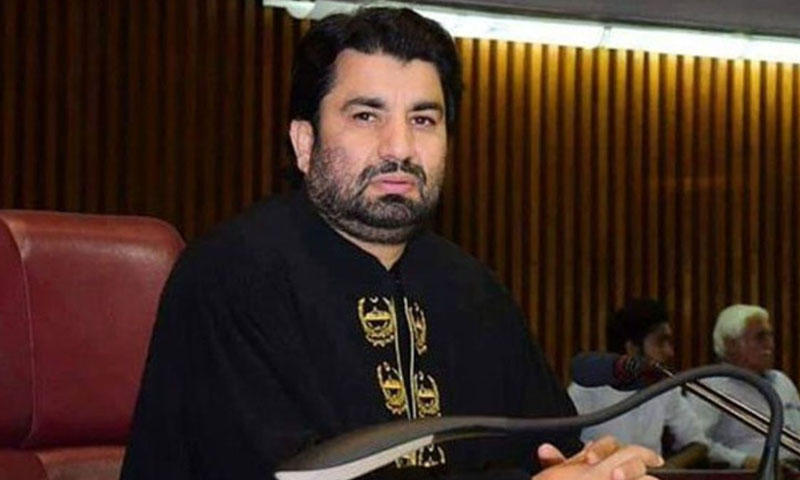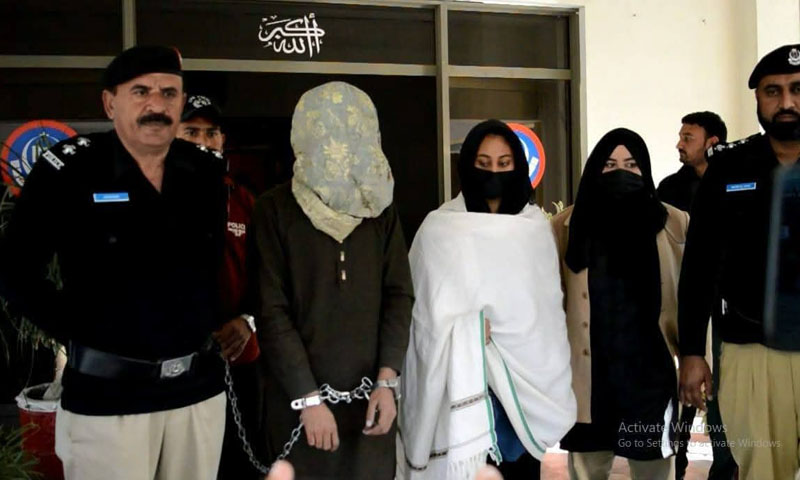- Web Desk
- Feb 09, 2026
Finance minister presents Rs18.87tr budget amid opposition protest
-

- Web Desk
- Jun 12, 2024

ISLAMABAD:
The federal government has presented a budget of more than Rs18.87 trillion for the next fiscal year 2024-25 in the National Assembly, containing a deficit of Rs8.5 trillion rupees.
The budget session was chaired by Speaker of the National Assembly Ayaz Sadiq. During the finance minister’s speech, opposition members continued protest in the House, and members of the Sunni Ittehad Council protested by standing on their seats.
However, Finance Minister Muhammad Aurangzeb continued with his budget speech, stating that the previous government should be praised for making a standby agreement with the IMF, which paved the way for economic stability and ended uncertainty. He noted that inflation had come down to 12 per cent in May, making food items more affordable.
Economic Outlook
Aurangzeb highlighted the possibility of further declines in inflation, attributing the success to ongoing financial stability efforts. He emphasized that investors are increasingly looking for opportunities in various sectors.
“It is a great honor for me to present the budget for the financial year 2024-25,” stated Aurangzeb.
This marked the first budget of the coalition government following the February 2024 elections.
Aurangzeb highlighted that Nawaz Sharif laid the foundations for economic reforms in Pakistan in 1990, and under Shahbaz Sharif’s leadership, economic challenges will be addressed and development accelerated. He acknowledged the recent economic difficulties, noting the rupee’s 10% depreciation within a year.
Despite these political and economic challenges, Aurangzeb praised the government’s economic progress and urged members to support the government’s development initiatives. He acknowledged the impact of inflation on the purchasing power of the people, particularly the salaried class, and outlined government measures to provide relief.
“Today, God has given Pakistan the opportunity to walk on the path of development,” Aurangzeb declared. He commended the government’s stand-by agreement with the IMF, noting that inflation has decreased to 12% and is expected to fall further in the coming days.
The minister emphasized that the country has emerged from the economic crisis but stressed the necessity of continued hard work to stabilize the economy. He also mentioned plans to increase government employees’ salaries, asserting that the government is working in the right direction.
The federal budget for the financial year 2024-25 includes significant salary and pension increases for government employees, as announced by Finance Minister Aurangzeb.
The proposed budget outlines a 25 per cent salary increase for government employees from grade 1 to 16 and a 22 per cent salary increase for those from grade 17 to 22.
Additionally, a 15 per cent increase in pensions for retired employees is proposed.
Finance Minister Muhammad Aurangzeb emphasized the need to boost exports to stay competitive in the global economy, highlighting the importance of prioritizing the private sector.
“In the past, the state was burdened with unnecessary responsibilities, leading to unaffordable government expenditures and inflation costs borne by the public,” Aurangzeb said.
Key points from the finance minister’s address include:
Economic Reforms
The finance minister underscored the need for market-based reforms in the power sector to reduce energy costs. He noted that a year ago, inflation had reached 35 per cent, but there has since been a significant increase in foreign exchange reserves and a reduction in inflation.
Privatisation and Subsidies
Aurangzeb announced that the PIA auction process would be completed in the first week of August 2024. He also stressed the importance of minimizing subsidies that distort prices and efficiency.
Pension and Welfare Reforms
To address the growing pension costs, a contributory pension scheme is being introduced for new employees, which will significantly reduce the government’s pension liabilities.
Additionally, he said that the Benazir Income Support Program (BISP) will see a 27 per cent increase in funding, amounting to Rs593 billion, with the number of beneficiaries in the Benazir Kafalat Programme increasing from 9.3 million to 10 million. The programme will also enroll 1 million children in the Education Vocational Program and include 500,000 more families in development initiatives.
Fiscal Responsibility
The government aims to reduce unnecessary spending as a key strategy to cut the fiscal deficit. This includes a proposal to eliminate vacant posts in BPS 1 to 16, potentially saving Rs45 billion annually. Furthermore, 50 billion rupees have been saved through a campaign against electricity theft.
Agricultural Support
He said that the government has allocated Rs5 billion for the Kisan package to support farmers.
Aurangzeb said that the current economic strategy focuses on public welfare through targeted programmes, reducing government expenditures, and encouraging investments to boost productivity.
Taxes
According to the budget documents, an 18% sales tax has been imposed on mobile phones, making textile and leather products more expensive as the sales tax rate has been increased from 15% to 18%. Additionally, sales tax has been imposed on copper, coal, paper, and plastic scrap. Shops selling non-custom-paid cigarettes will be closed. The tax exemption previously granted to FATA and PATA residents has been removed, although income tax exemptions for these residents will continue for one more year. The exemption on sales tax is also proposed to be removed, with changes suggested for the income tax slabs for the salaried class. The non-salaried class will face a maximum tax rate of 45%.
Also read: Finance Minister announces salary, pension increases in Budget 2024-25
For property transactions, a 15% tax will be levied on filers, while non-filers will be taxed up to 45%. Additionally, a federal excise duty of 44,000 rupees per kilogram will be imposed on the raw material used in cigarette filters.
Power Sector
Aurangzeb highlighted the challenges faced by the energy sector, particularly revolving debt, which has become unsustainable. To address these issues, the government plans to improve transmission and distribution to reduce losses in the power sector.
Agriculture
In his budget speech, the finance minister emphasized the importance of agriculture, which constitutes 24% of the country’s GDP and provides employment to 37.4% of the population. Agriculture is crucial for the country’s food security and the productivity of the industrial sector. It is also a significant source of foreign exchange through agriculture, livestock, and fisheries. The Prime Minister’s Kisan Package, announced in 2022, includes a proposed allocation of Rs5 billion for the next year.
Incentives for Overseas Pakistanis
Aurangzeb acknowledged the vital role of overseas Pakistanis in the country’s economy, proposing an allocation of Rs86.9 billion for the promotion of remittances. This amount will support the Sohni Dharti scheme and other initiatives.
IT Sector
In his budget speech, the finance minister announced an allocation of Rs79 billion for the IT sector. This includes Rs8 billion for the establishment of an IT Park in Karachi, Rs11 billion for a Technology Park Islamabad project, and Rs20 billion for digital infrastructure development.
Economy
Finance Minister Aurangzeb projected an economic growth rate of 3.6% for the fiscal year 2024-25, with an average inflation rate of 12%. The budget deficit is expected to be 6.9% of GDP, while the primary surplus is anticipated to be 1% of GDP. FBR revenues are estimated at 12,970 billion rupees, with 7 billion rupees allocated for FBR reforms. The total federal government expenditure is projected at 18,877 billion rupees, with the provinces’ share amounting to 7,438 billion rupees. The target for federal non-tax revenue is set at 3,587 billion rupees, resulting in a net federal government income of 9,119 billion rupees.
Key Allocations
Luxury and Hybrid Vehicles
The federal budget documents reveal significant changes in the import policies for vehicles. The discount on the import of luxury vehicles has been withdrawn, while the customs duty on the import of hybrid vehicles has been abolished, marking a notable shift in the government’s approach to vehicle imports.
Industries and Climate Change
In his budget speech, Finance Minister Muhammad Aurangzeb announced an increase in the volume of credit provision to medium-scale industries, raising it to 1,100 billion rupees. He commended the role of the Special Investment Facilitation Council (SIFC) in enhancing foreign investment, noting ongoing agreements between Pakistani and Chinese companies.
Additionally, the Pakistan Climate Change Authority is being made operational. The establishment of this authority will help formulate a coherent strategy to tackle climate change, a crucial step towards environmental sustainability.
The finance minister outlined several key allocations in the budget:
The government has allocated Rs2,122 billion for defence expenditures; Rs824 billion for infrastructure in PSDP; Rs279 billion for transport and communication; Rs280 billion for social sector; Rs64 billion for merged districts of Khyber Pakhtunkhwa and Rs75 billion for Azad Jammu and Kashmir and Gilgit-Baltistan.
Prime Minister’s Congratulations
Finance Minister Muhammad Aurangzeb presented a copy of the Finance Bill 2024, including the annual budget statement, in the National Assembly. Prime Minister Shehbaz Sharif extended his congratulations to Finance Minister Muhammad Aurangzeb for successfully formulating the budget.
The presentation of this comprehensive budget marks a significant step towards economic stability and growth, with targeted measures to enhance investment, support industries, and address climate change.




